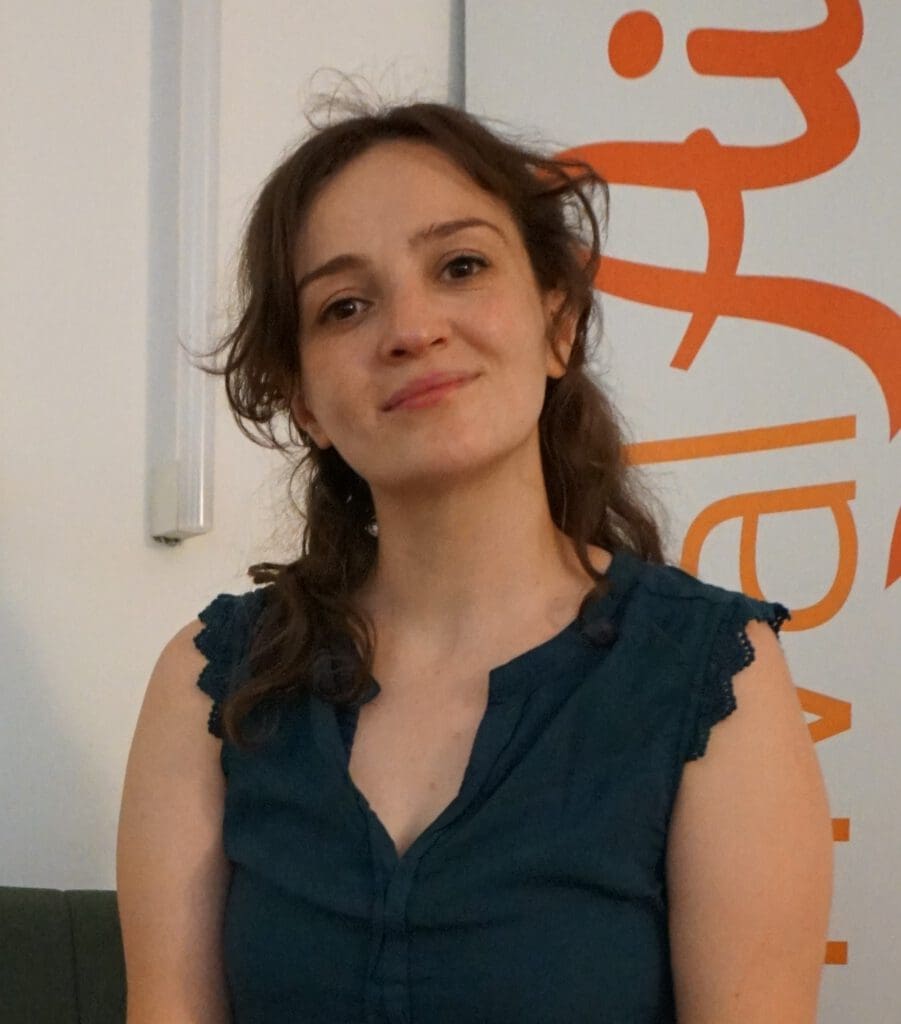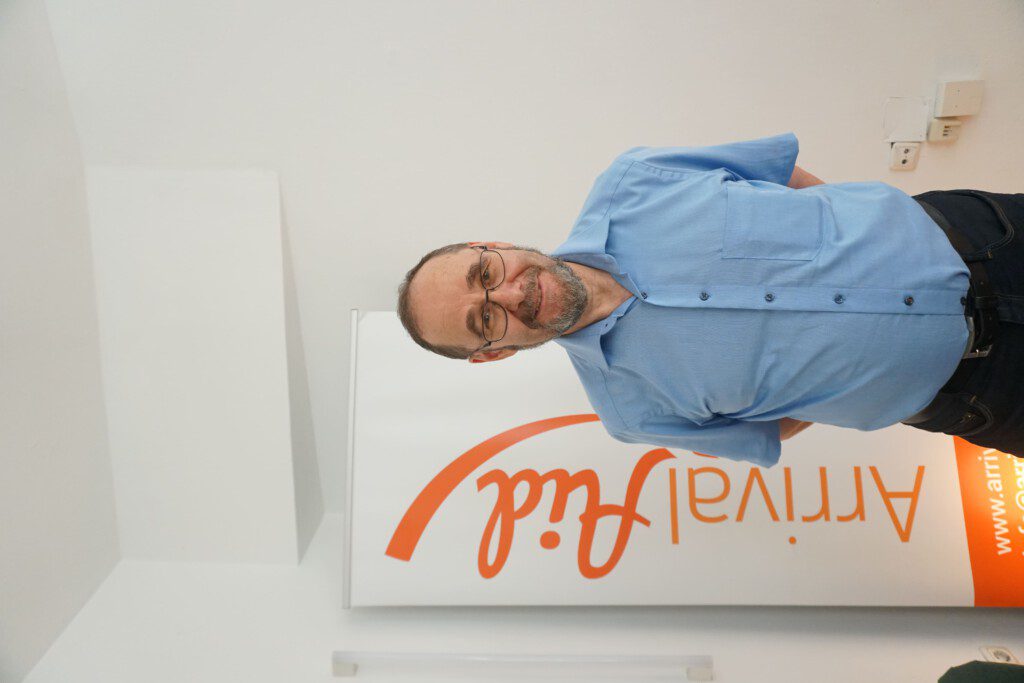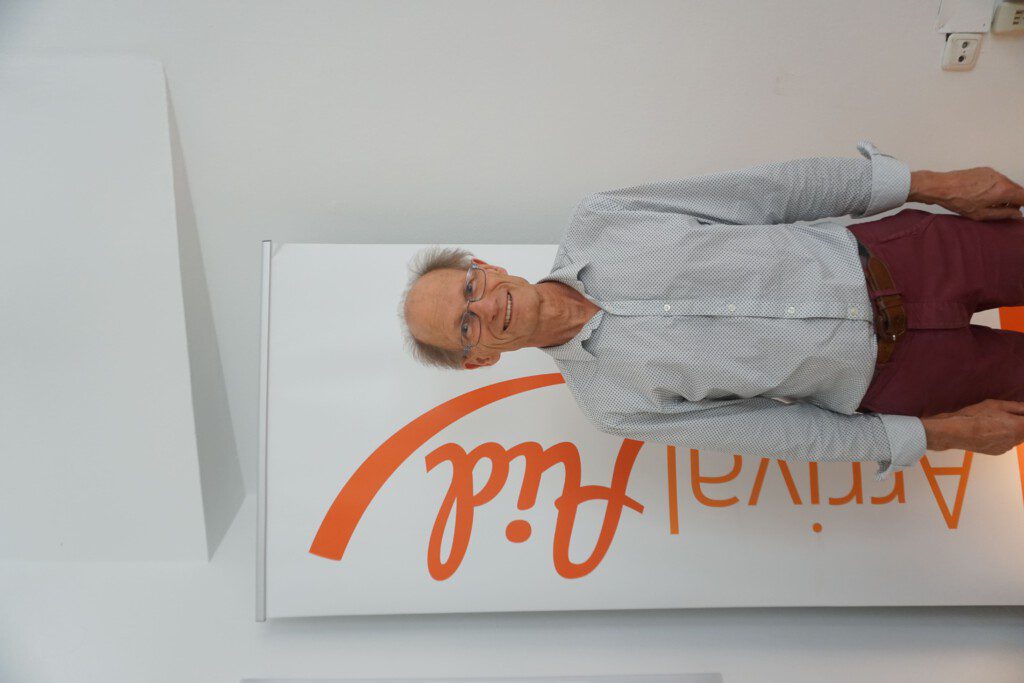Mach mit bei ArrivalAid
Wir suchen immer ehrenamtliche Helfer*innen und Kooperationspartner*innen
Jetzt mitmachen!
In allen Programmen von ArrivalAid sind Ehrenamtliche aktiv. Nur durch sie ist die Unterstützung der Klient*innen möglich. Werde auch du Teil des ArrivalAid-Teams!
Das bringst du ein
- Zeit – einmalig, regelmäßig oder langfristig
- Wissen – z.B. über den Bewerbungsprozess
- Deinen Wunsch, Geflüchtete und Migrant*innen zu unterstützen
Das nimmst du mit
- Austausch auf Augenhöhe mit geflüchteten Menschen
- Neue Erfahrungen
- Interkulturelle Kompetenz
"Darum machen wir mit..."
Das sagen unsere Ehrenamtlichen zur Arbeit bei ArrivalAid

Azada Henze
Sprachen: Deutsch, Aserbaidschanisch, Russisch, Englisch
Deutsches Lieblingswort: Wanderlust
“Wenn du überlegst, selbst ehrenamtlich tätig zu werden. Dann wage jetzt den ersten Schritt und fange einfach an.“
Heute stellen wir euch unsere liebste Azada vor. Azada kommt aus Aserbaidschan und ist seit 1 ½ Jahren dabei. Wir wollen euch heute von ihr und ihren Erfahrungen berichten.
Weg ins Ehrenamt und Mitarbeit an der Entwicklung der ArrivalAid-App
Azada hat von Anfang an zusammen mit dem Softwareunternehmen iteratec GmbH ehrenamtlich an der Entwicklung der App gearbeitet. Mit dieser App werden künftig die Dolmetscheinsätze von TranslAid vermittelt. Jede*r Ehrenamtliche bekommt dann die Vorschläge zu den Einsätzen direkt in der App und kann sie dort buchen. Bei der App-Entwicklung hat Azada die Kalenderbuchung programmiert. Man kann dort seinen Urlaub eintragen. Und dann bekommt man in dieser Zeit keine Einsätze oder E-Mails. Am Ende hat Azada dann getestet, ob alles so funktioniert.
“Der schwierige Teil an der Entwicklung war, dass es nicht mein Spezialgebiet beim Programmieren ist und auch eine für mich neue Programmiersprache genutzt wurde. Aber das Team war super und dann hat alles gut funktioniert. Ich habe am Anfang 10 – 16 Stunden pro Woche an der App gearbeitet. Jetzt ist es weniger. Jetzt übernehme ich aber mehr Einsätze als Sprachmittlerin. Ich dolmetsche am meisten in Russisch. Dort gibt es viele Einsätze.”
Azada wollte sich ehrenamtlich engagieren. In Fürstenried, wo sie früher gewohnt hat, gibt es ein ehrenamtliches Zentrum. Dort gab es verschiedene Ausschreibungen für Ehrenämter. In diesem Zentrum hat Azada von der Möglichkeit erfahren die App für TranslAid mitzuentwickeln. Zu diesem Zeitpunkt wusste sie noch nicht viel über TranslAid und ArrivalAid. Nachdem sie die Projekte kennengelernt hatte, war sie begeistert und ist deswegen bis heute ehrenamtlich für TranslAid tätig.
Erfahrungen bei TranslAid
Immer wieder geht es bei den Einsätzen um schwierige Themen, sagt Azada. Oft war sie zum Dolmetschen bei Einsätzen im Krankenhaus. Vor allem für die Personen, die die Übersetzung gebraucht haben, waren es schwierige Situationen. Die Einsätze als Sprachmittler*innen können also für die Sprachmittlerin und für die Hilfe benötigende Person anstrengend und belastend sein.
“Einmal hat eine Frau bei einem Einsatz fast geweint, als sie erfahren hat, dass wir uns bei TranslAid alle ehrenamtlich engagieren.”
Azada sagt, dass sie sich über diese Reaktion sehr gefreut hat, weil sie gemerkt hat, dass bei TranslAid etwas Gutes getan wird.
Es gibt zwei Herausforderungen als Sprachmittlerin, sagt Azada. Die eine ist eher technisch und die andere eher emotional. Manchmal gibt es Wörter, die auf Deutsch schwierig sind. Denn Deutsch ist nicht Azadas Muttersprache. Da ist es dann manchmal schwer, die Aussagen richtig zu übersetzen. Auf der anderen Seite ist es schwer, sich von den Personen bei den Einsätzen zu distanzieren, weil es teilweise um belastende Themen geht. Es tut ihr immer leid, wenn Personen bei einem Einsatz eine schlechte Diagnose bekommen.
Tipps zum Dolmetschen
Andere Menschen in Deutschland sagen oft, dass es nicht notwendig ist, sich zu engagieren, weil es in Deutschland schon so viele Angebote gibt. Azada ist da anderer Meinung. Es gibt einen großen Bedarf und es sollten sich noch mehr Menschen engagieren. Man muss sich aber klar sein, dass man im Ehrenamt auch professionell sein muss. Auch wenn es in der Freizeit stattfindet, ist es eine Arbeit und man muss es ernst nehmen. Vorbereitung ist auch wichtig und man muss immer mit dem Kopf bei der Sache sein.
Azada hat dafür einen Tipp: Wenn eine Person neu mit dem Dolmetschen beginnt, sollte er oder sie sich immer gut vorbereiten. Am Anfang langsam einsteigen und nur wenige Einsätze übernehmen. Vielleicht alle 2 oder 3 Wochen einen Einsatz. Damit man nicht gleich denkt, dass alles zu viel ist und man keine Zeit dafür hat. Es ist besser, wenn man eher langsamer anfängt und dann aber konsistent dabei ist. Es ist auch wichtig, dass man lernt, wie viel man machen kann. Und auf diese eine Aufgabe kann man sich dann gut konzentrieren.
“Wenn du überlegst, selbst ehrenamtlich tätig zu werden. Dann wage jetzt den ersten Schritt und fange einfach an.“
Motivation zum Engagement bei TranslAid
Azada ist es wichtig, sich bei TranslAid zu engagieren, weil sie selbst vor 10 Jahren ohne Familie nach Deutschland gekommen ist. Sie ist der Meinung, dass Menschen, die aus einem Land fliehen, in dem Land, in dem sie ankommen, Unterstützung bekommen müssen. Sie glaubt an die Ideen und Ziele von TranslAid und möchte Menschen unterstützen. Für sie ist es besonders wichtig, weil sie die Situation der Menschen gut nachvollziehen kann. Azada empfand die Sprache am Anfang als besonders große Hürde und hatte leider keine Unterstützung. Es war auch psychisch schwierig, weil die Leute sie nicht verstanden haben und Azada sie auch nicht.
Sie glaubt, es ist für geflüchtete Menschen wichtig zu wissen, dass es Unterstützung für sie gibt und Menschen, die helfen wollen. Viele ihrer Freund*innen, die auch aus Aserbaidschan kommen, hätten sich eine solche Unterstützung bei ihrer Ankunft auch gewünscht.
Das schwierigste deutsche Wort, sagt Azada, ist “gleichgeschlechtlich”. Sie fand es sehr schwer auszusprechen, als sie es zum ersten Mal gehört hat. Dagegen findet Azada “Wanderlust” ein sehr schönes deutsches Wort. Auch wenn das sehr viele Menschen sagen, deren Muttersprache nicht Deutsch ist. Azada findet es schön, weil sie es bisher noch in keiner anderen Sprache gehört hat.
Vielen Dank für das Interview und dein Engagement als ehrenamtliche Dolmetscherin und App-Entwicklerin!
Dr. Jan Mühlstein
“Warum engagiert man sich eigentlich nicht? Das gehört zu dem, was man in eine Gesellschaft einbringen sollte.”
Wie bist du zu ArrivalAid gekommen?
Eine meiner drei Töchter ist mit Cornelius Nohl befreundet und hat mir erzählt, dass Cornelius die Gründung einer Organisation plant, die in die Lücke stoßen will bei der Betreuung von Flüchtlingen – also bei der Vorbereitung und Begleitung zum Asylgespräch. Das hat mich interessiert. Ich habe mich beworben und wurde für die erste Ausbildungsgruppe genommen, das war 2015.
Wie zeitlich aufwendig ist dein Engagement? Wie viele Stunden pro Woche engagierst du dich?
Das ist sehr stark schwankend. Ich habe eine Zeit lang relativ viele Fälle übernommen, dann eine längere Pause gemacht und jetzt bin ich wieder eingestiegen. Es hängt davon ab, wie viele Fälle man hat. Ich würde sagen, im Schnitt 2 bis 3 Stunden die Woche, nicht mehr.
Ist das dein einziges Ehrenamt?
Ich bin seit meinem Studium immer ehrenamtlich tätig gewesen für viele Organisationen, z. B. Amnesty International, und ich bin in einer religiösen Gemeinde aktiv.
Warum hast du dich dafür entschieden, dich zu engagieren?
Für ArrivalAid habe ich mich entschieden, weil mich genau die Fokussierung auf eine Aufgabe interessiert hat. Und es meinen Möglichkeiten, mich zu engagieren, entsprochen hat. Ich hätte nicht die Zeit gehabt und vielleicht auch nicht die Eignung, Flüchtlinge in einem Helferkreis, auch langfristig, zu betreuen. Schon aber, mich speziell mich auf dieses Thema zu fokussieren.
Generell halte ich ehrenamtliches Engagement für selbstverständlich. Die Frage ist: Warum engagiert man sich eigentlich nicht? Das gehört zu dem, was man in eine Gesellschaft einbringen sollte.
Inwiefern bringt dir dein Engagement bei ArrivalAid etwas auf persönlicher Ebene?
Ich selbst bin mit 20 aus der Tschechoslowakei nach dem Einmarsch der sowjetischen Armee in Prag nach Deutschland geflüchtet. Das ist sicherlich eine Erfahrung, die ich bei ArrivalAid einbringen kann. Das Wissen wie es ist, wenn man in einer Gesellschaft ankommt, in der man sich nicht auskennt. Aber das war nicht meine primäre Motivation.
Ich habe mich schon immer mit dem Thema Asyl beschäftigt – mehr oder weniger. Wir haben auch während der ersten Flüchtlingswelle eine Initiative in Gräfelfing gegründet – wo ich wohne. Wir wollten erreichen, dass die Gemeinde Räume für Flüchtlinge bereitstellt – damals erfolglos.
Würdest du anderen empfehlen, sich ehrenamtlich zu engagieren?
Grundsätzlich würde ich jedem empfehlen, sich ein ehrenamtliches Engagement zu suchen. Gerade in der Lebensphase, in der ich mich jetzt befinde – in Rente. In den ersten Jahren der Rente ist es doch zusätzlich eine positive Sache, dass man eine Aufgabe hat. Aber ich denke, dass das auch in jüngeren Jahren den Horizont erweitert, wenn man aus den bekannten Kreisen, in denen man sich privat und beruflich bewegt, hinausgeht und andere Welten kennenlernt. Es ist sehr nützlich, auch um eigene Positionen zu überprüfen.
ArrivalAid kann ich sehr empfehlen, weil es eine Organisation ist, die sich sehr genau überlegt, wie man Ehrenamtliche vorbereitet und begleitet. Die Angebote wie Erfahrungsaustausch, Fortbildung und Supervisionen finde ich sehr gut. Ich kenne das aus anderen Organisationen nicht so intensiv.
Gibt es ein Erlebnis aus deiner ehrenamtlichen Arbeit, das dir besonders in Erinnerung geblieben ist?
Es bleiben schon einige Ereignisse im Gedächtnis, vermutlich auch besonders die negativen, also z. B. die langen Wartezeiten im BAMF (Bundesamt für Migration und Flüchtlinge). Ich hatte eine Anhörung, bei der wir um 8 Uhr morgens geladen waren, zur Anhörung kam es dann irgendwann um 16 Uhr und erst fast um 21 Uhr waren wir dann fertig.
Ich glaube, fast jede Begegnung mit einem der Flüchtlinge, die ich betreut habe, ist eine positive Erfahrung. Man merkt, dass man doch etwas bewirken kann, nämlich dem Flüchtling zur Orientierung zu helfen und ihm vielleicht auch ein Stück mehr Chancen in dem ganzen Asylprozess zu verschaffen. Chancen in dem Sinne, dass sie oder er weiß, worauf es ankommt, nicht in dem Sinne, dass man zur Anerkennung verhilft. Das wäre, glaube ich, eine falsche Erwartung an unsere Arbeit. Wir können als Ehrenamtliche nicht erreichen, dass die Flüchtlinge anerkannt werden, da haben wir den wenigsten Einfluss. Aber wir können zu einem fairen Verfahren beitragen und das ist glaube ich nicht wenig.
Möchtest du sonst noch etwas sagen?
Nur andere ermutigen, sich bei ArrivalAid eine Aufgabe zu suchen. Über die Anhörungsbegleitung ist das Spektrum von ArrivalAid ja viel breiter geworden, da gibt es viele Möglichkeiten, die man wahrnehmen kann. Oder: sich anderswo engagieren!


Oskar Schmid
„Nur Beruf und Selbstverwirklichung, da fehlt noch etwas. Und es ist gar nicht so altruistisch wie man sich das vorstellt – das bringt einem auch was.“
Wie bist du zu ArrivalAid gekommen?
Das war 2015/16. Da war ja die „Flüchtlingskrise“. Dieses Wort gefällt mir nicht. Da sind ja so viele Flüchtlinge gekommen. Und es war klar, dass es eine große Geschichte eigentlich schon ist und sicher wird. Und dann habe ich überlegt, wie kann ich mich einbringen? Was kann ich machen? Ich weiß nicht mehr wie, aber ich bin dann auf ArrivalAid gestoßen. Und damals war ja noch nur die Anhörungsberatung und Anhörungsbegleitung. Und ich fand das eine super tolle Geschichte, wo ich mir gut vorstellen konnte, aktiv zu werden. Dass mir das liegt. Ich habe dann auch den Eindruck gehabt, an der richtigen Stelle zu stehen.
War das dein erstes Ehrenamt?
Nein, ich hatte schon unzählige. Ich habe gerade nochmal überlegt. Ich glaube ich war bei der zweiten Schulung Anfang 2016 erst dabei. Bei der ersten hat es terminlich nicht geklappt.
Wie viele Stunden pro Woche engagierst du dich für ArrivalAid?
Das ist total schwer zu sagen, weil ich das nicht aufschreibe. Ich würde mal sagen so bestimmt 5 Stunden pro Woche.
Hast du dich aktiv für ArrivalAid entschieden?
Ich bin durch Zufall auf ArrivalAid gestoßen und als ich dann gelesen habe worum es geht, war für mich die Entscheidung klar. Da musste ich nicht lange nachdenken.
Wusstest du genau, was du ehrenamtlich machen wolltest?
Nein, ich wusste das nicht genau. Aber als ich das Angebot gesehen habe, war mir klar, dass das eine ganz tolle Möglichkeit für mich ist.
Würdest du anderen empfehlen, sich bei ArrivalAid zu engagieren?
Jederzeit. Ich bin nur nicht so ein begnadeter Überreder. Ich kann aber ArrivalAid nur jedem herzlich weiterempfehlen. Als Verein, bei dem man sich engagieren kann, bei dem man auch viel Freiheit hat. Wo man im Prinzip allein schauen muss, wie man klarkommt, aber gleichzeitig im Rücken immer die Organisation hat. Ich finde es toll, so zu arbeiten.
Würdest du ehrenamtliches Engagement generell empfehlen?
Ja jederzeit! Nur Beruf und Selbstverwirklichung, da fehlt noch etwas. Und es ist gar nicht so altruistisch wie man sich das vorstellt – das bringt einem auch was. Und wenn ich mir jetzt überlege: Die ganzen Flüchtlinge, mit denen ich jetzt zu tun habe. Auf eine Art sind das Freundschaften. Das sind oft ganz tolle Beziehungen, die über Jahre gehen.
Das ist bei ArrivalAid ja auch so gewesen, nach der Anhörungsberatung kam die Klageberatung und dann kam die Integrationsberatung. Ich habe an den Ausbildungen jetzt nicht formal teilgenommen, mache das aber ganz automatisch. Und laufe mit. Die Flüchtlinge rufen mich an, wenn sie Briefe vom BAMF oder vom Gericht bekommen. Und dann gehe ich mit zum Anwalt, weil der oft auch nicht nur aufgrund der Protokolle entscheidet.
Bedeutet das, dass dein Engagement über die reine Anhörungsvorbereitung hinausgeht?
Ja, bei mir definitiv.
Hast du ein Erlebnis, das dir bei deiner ehrenamtlichen Arbeit besonders in Erinnerung geblieben ist?
Es gibt einfach oft bei Anhörungen wahnsinnig tolle Konstellationen mit den Anhörern. Die können ja extrem krätzig sein. Aber dann am nächsten Tag gibt es einen, der einfach normal ist. Und sowas finde ich total aufbauend, wenn man sieht, wie normal sowas sein kann. Dass da jemand hockt, der sich mit dem Fall schon einmal ausführlich befasst hat. Das ist natürlich eine Hilfe, wenn man sich darauf einlässt.
Ich mache das so, dass ich dem Anhörer nicht reinrede und nicht im Handwerk rumpfusche, nur wenn ich sehe, dass Irrtümer passieren. Und es passieren viele Irrtümer bei Anhörungen, die überhaupt nicht böse gemeint sind. Und die man einfach genau dann merkt, wenn man den Fall schon einmal gehört hat. Und dann schätzen die Anhörer das auch. Wenn sie feststellen, dass das nicht einer ist, der ständig reinquatscht, dann schätzen die das.
Und natürlich gibt es auch negative Ereignisse, aber denen will ich gar keinen Platz geben.
So kannst du uns als ehrenamtliche*r Begleiter*in unterstützen
- Fülle das Anmeldeformular aus, indem du unten auf dieser Seite auf „Jetzt bewerben“ klickst
- Nach Erhalt deiner Bewerbung vereinbaren wir mit dir ein Telefonat, um dich näher kennenzulernen
- Danach laden wir dich zur passenden Einstiegsschulung ein
- Open and communicative manner in dealing with people from different cultures
- Time and motivation for a commitment of around 4 hours per month for around 1 year
- Advanced knowledge of German
- Wohnhaft in München oder Umgebung
- Entry level training
- Full-time contact person
- Supervision offer
- Exchange with other volunteers
- Certificate of volunteer work
You can find more information about the other programs here:

